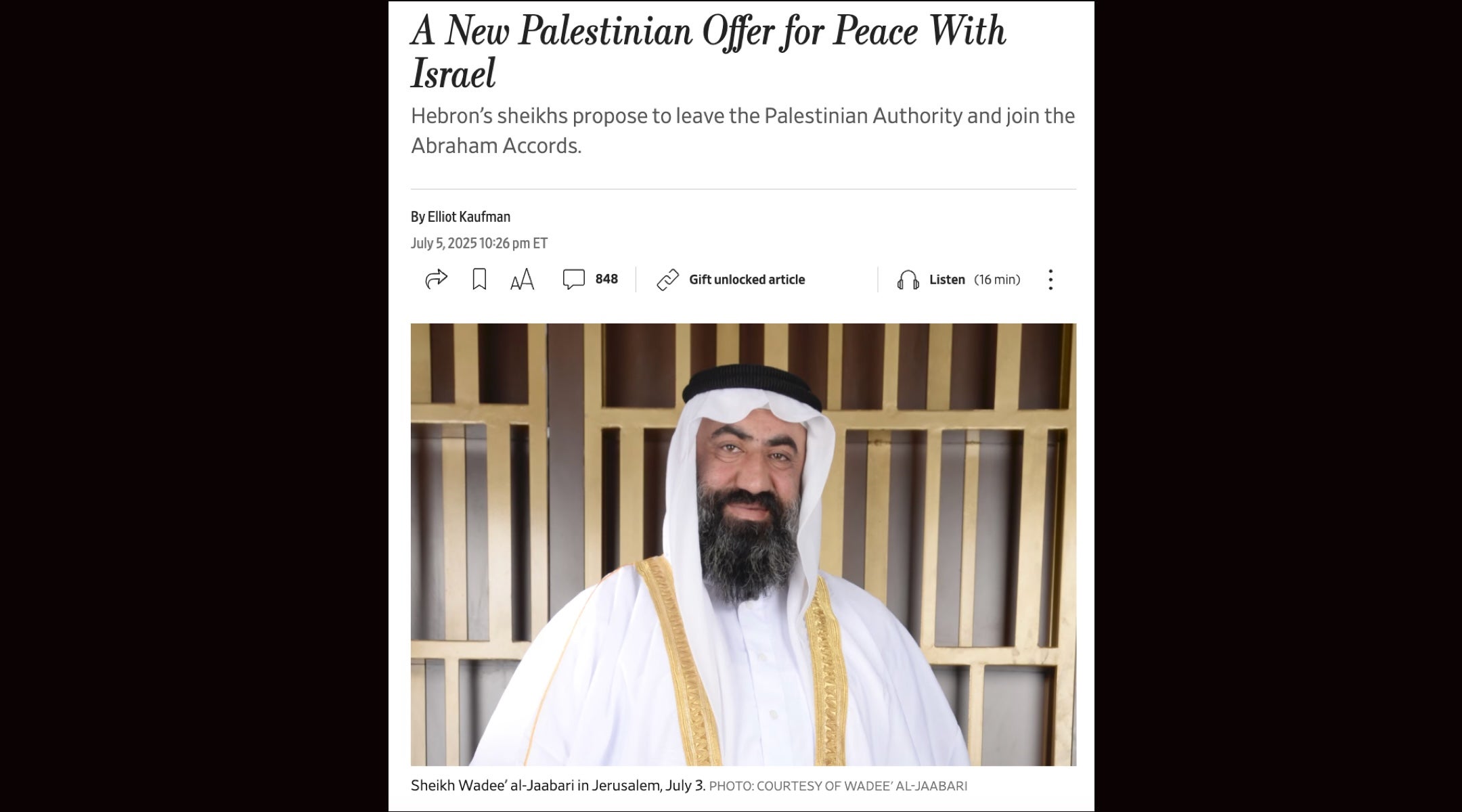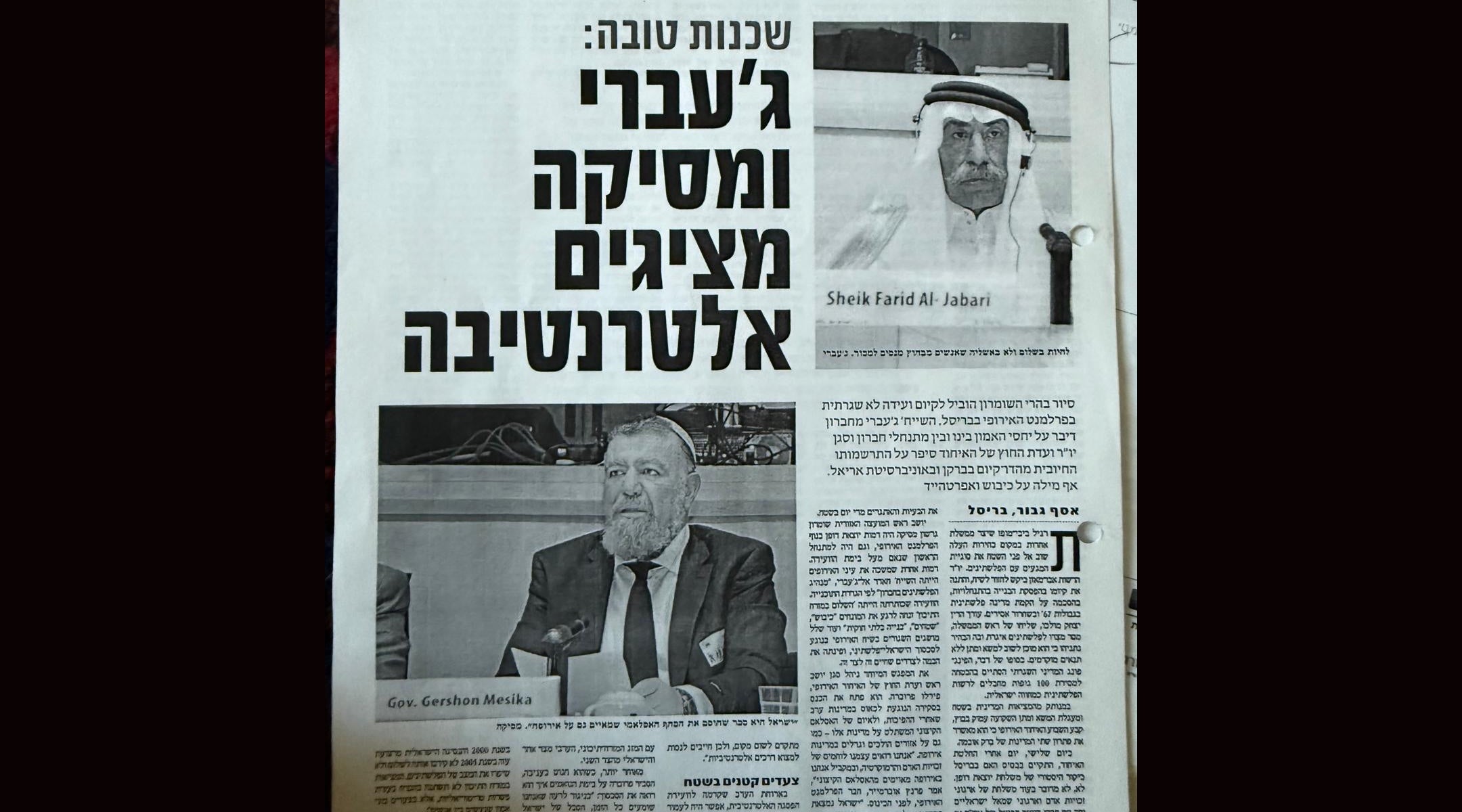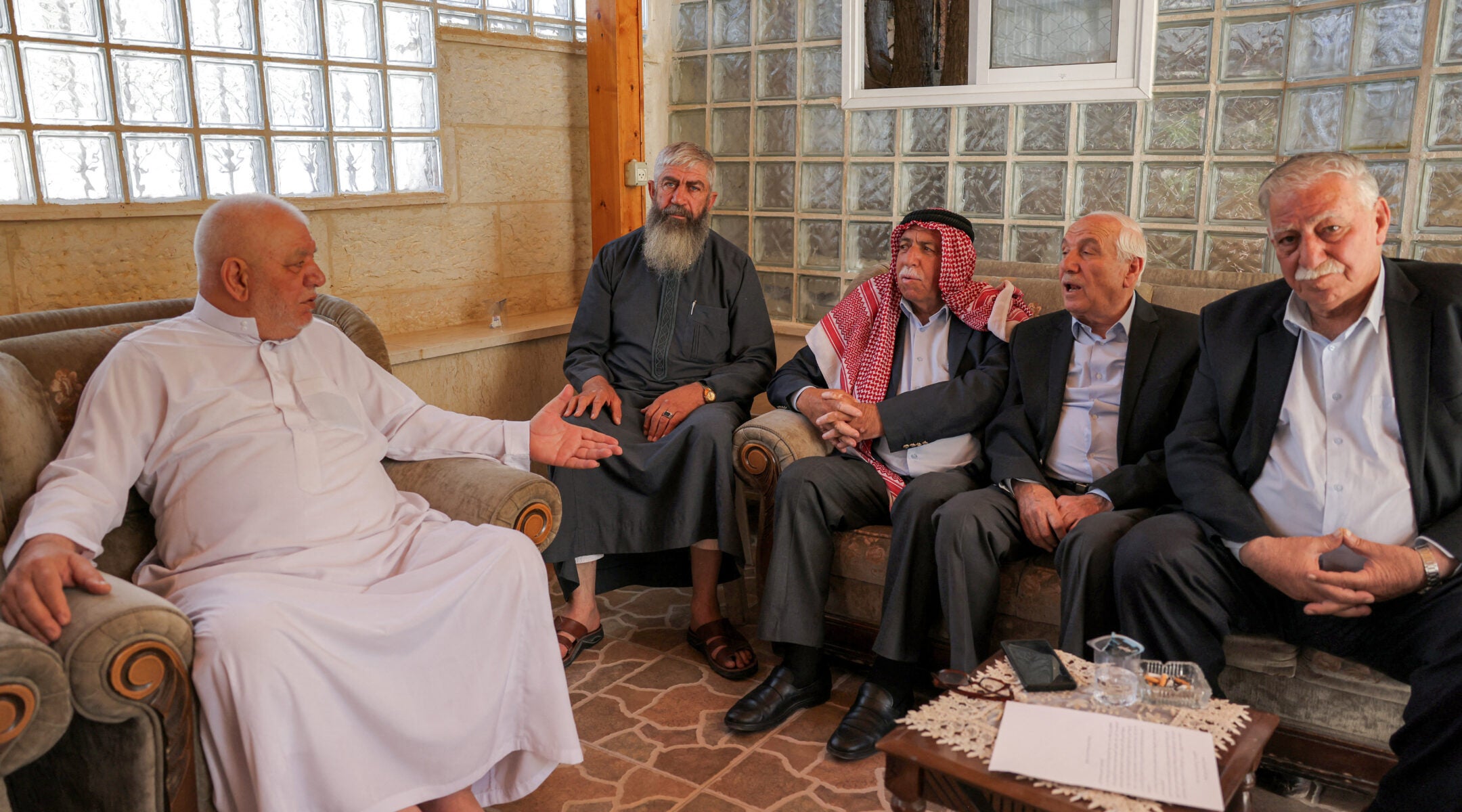Could the key to Middle East peace come not from military victory or White House pressure but a coterie of sheikhs in the West Bank?
Almost certainly not, according to regional experts. But that didn’t stop an unorthodox proposal this week from five prominent sheikhs in the Hebron region from stirring excitement among some in the region, particularly among those who are eager to advance peace that sidesteps the possible creation of a Palestinian state.
The sheikhs offered full recognition of Israel as a Jewish state and proposed a peaceful break from the Palestinian Authority to form an autonomous “Emirate of Hebron” aligned with the Abraham Accords. The region would partner with Israel and include “zero tolerance” for terrorism, according to a letter from Sheikh Wadee al-Jaabari, a senior figure in one of Hebron’s most influential clans, to Israel’s Economy Minister Nir Barkat. The letter was first reported by the Wall Street Journal.
Jaabari told the newspaper that he and the other sheikhs — who remain anonymous — understood that there was no point in pressing for a Palestinian state.
“There will be no Palestinian state — not even in 1,000 years,” he said. “After Oct. 7, Israel will not give it.”
Barkat, who according to the report met with the sheikhs around a dozen times over the past five months, praised the proposal, arguing that the Palestinian Authority has lost the trust of both its own people and the Israeli public.

The Wall Street Journal profiled Wadee al-Jaabari, a Hebron sheikh leading a proposal for peace with Israel that would sidestep the Palestinian Authority. (Screenshot)
“Sheikh Jaabari wants peace with Israel and to join the Abraham Accords, with the support of his fellow sheikhs. Who in Israel is going to say no?” Barkat said.
On Wednesday, al-Jaabari’s car was set ablaze in east Jerusalem, in an act of vandalism widely seen as a response to his proposal. Some members of his family formally disowned him.
Harel Chorev, a researcher of Palestinian clans at Tel Aviv University, maintained that the plan was neither new nor feasible. A similar proposal last made headlines in 2012, when Wadee al-Jaabari’s father, Sheikh Farid Jaabari, attempted to advance it. Chorev described the proposal as “a fantasy of some on Israel’s far right, who see the Palestinian Authority as the enemy,” and who hope for an alternative vision — whether through tribal emirates or a federate model — that would eliminate the prospect of Palestinian statehood altogether.
Chorev said the Jaabaris were motivated largely by nostalgia. “They want to restore their golden era,” he said, referring to the period from the 1940s to the late 1970s when the clan held sway and maintained ties with Israeli authorities.
Despite its unlikelihood, the sheikhs’ proposal has stoked chatter — from excitement to condemnation — at a time when some Israeli officials are openly questioning the future of the PA. In Gaza, for example, Israeli Prime Minister Benjamin Netanyahu has vowed that the PA will never rule the territory once the war is over.
In their letter, the sheikhs reject the two-state solution and propose a new arrangement to replace the Oslo Accords, which they say “only brought damage, death, economic disaster and destruction,” according to the Wall Street Journal’s report.
Their plan includes a step-by-step proposal to allow 1,000 Hebron residents to begin working in Israel, with the goal of gradually increasing that number to 50,000. Since the Oct. 7 attack by Hamas, Israel has sharply reduced Palestinian work permits, cutting off a key source of income for many families. It would also include the creation of a joint economic zone on more than 1,000 acres near the security fence between Hebron and Israel, expected to employ tens of thousands, the article said.
Ultimately, according to the plan, Hebron would serve as a pilot for a broader transformation in the West Bank, with other cities such as Bethlehem potentially transitioning to independent local emirates if the model succeeds.
It has been in development for years with the involvement of Samaria Regional Council head Yossi Dagan and Middle East scholar Mordechai Kedar, a longtime proponent of replacing Palestinian national leadership with local clan-based governance.

A 2012 newspaper article features Farid al-Jaabari, a Hebron sheikh, proposing a peace plan with an Israeli partner. (Courtesy Harel Chorev)
Though it has some backers, the proposal was much more widely dismissed when it broke into public view this week.
Palestinian activist and Hebron resident Issa Amro panned the article as a “dangerous fabrication” and called out its author, Elliot Kaufman, a member of WSJ’s editorial board, for “shockingly poor journalism or deliberate misinformation.”
Elior Levy, the Palestinian affairs correspondent for Kan public broadcaster, also dismissed the article as “nonsense.”
“Words come cheap, and these recycled statements have led to nothing [in the past],” he wrote on X. “I advise the Wall Street Journal to focus more on Wall Street and less on Hebron.”
Michael Milstein, a former senior IDF intelligence officer and expert on Palestinian society, told Kan public radio that the initiative reflects a persistent fantasy among some in Israel: that instead of dealing with a unified Palestinian leadership with national aspirations, it might be possible to divide Palestinian society into clans and local emirates, a kind of “divide and conquer” approach that would erode the idea of statehood.
“But the truth is,” he said, “no one in the Palestinian arena buys into this.”
Milstein compared the proposal’s embrace by some to Israel’s growing reliance on the Abu Shabab clan in Gaza, a local militia Israel has backed in hopes it might help counter Hamas. “Once again, like with the Abu Shabab story, we’re entering a situation where fantasies override clear-eyed assessment,” he told Kan.
Even some in the Jaabari clan rejected the proposal, releasing a video statement, reposted on the Hamas-affiliated Quds News Network, disavowing it and its authors and affirming the clan’s commitment to “Islamic and national principles.” The statement also boasted that the Jaabari family “has sacrificed hundreds of martyrs, wounded, and prisoners on the land of Palestine,” a line omitted from the similar written disavowal shared by Amro on X.
For his part, Chorev said the claim that the Jabaari clan had produced “hundreds” of individuals involved in political or militant activity leading to imprisonment or death was “definitely an exaggeration.”
“Very few people were involved in terror activity,” he said, adding that such claims were likely intended “to convince everybody that they are loyal to the Palestinian issue.”
He added that those denouncing the sheikh were not likely to represent the majority, noting that as far as he knew, Wadee al-Jabaari was “the strongest at the moment in the clan,” though rivalries persisted. The clan, he said, was made up of “a cluster of families or sub-clans,” including groups with no blood relation who were historically brought in as workers for the late Sheikh Muhammad Ali al-Jabaari – who served as mayor of Hebron for nearly three decades – and who later took on the family name.
Still, the Jaabari clan, which historically led the southern West Bank city and its environs for decades, is not representative of the wider Palestinian public, even within Hebron, he said.
“They are very tribal in the sense that their allegiance is to the clan,” he said. That orientation, he explained, sets them apart from most Palestinians, particularly outside Hebron, who tend to see themselves as part of a broader national identity. “That’s why I don’t see this working,” he said. “They will have a very hard time standing up against a much larger, national organization like the Palestinian Authority, or even movements like Fatah and Hamas.”
Support for Hamas in the Hebron area, Chorev said, stems largely from resentment toward the PA, which is seen as corrupt and exclusionary, rather than from ideological alignment. “It’s not the kind of support you see in Gaza, of people who necessarily want to oppose Israel,” he said.
Still, Jaabari’s proposal, Chorev said, “doesn’t align with reality.”
“I say this as someone who loves the Jaabaris — they’re like family to me,” said Chorev, who spent part of his doctoral research on the Jaabari clan. “If only it could work.”
JTA has documented Jewish history in real-time for over a century. Keep our journalism strong by joining us in supporting independent, award-winning reporting.






